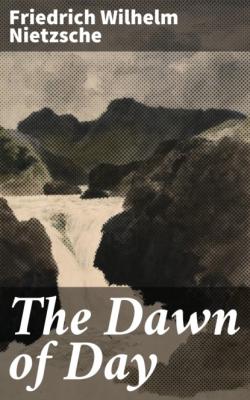The Dawn of Day. Friedrich Wilhelm Nietzsche
Читать онлайн.| Название | The Dawn of Day |
|---|---|
| Автор произведения | Friedrich Wilhelm Nietzsche |
| Жанр | Языкознание |
| Серия | |
| Издательство | Языкознание |
| Год выпуска | 0 |
| isbn | 4064066099350 |
5.
But, after all, why must we proclaim so loudly and with such intensity what we are, what we want, and what we do not want? Let us look at this more calmly and wisely; from a higher and more distant point of view. Let us proclaim it, as if among ourselves, in so low a tone that all the world fails to hear it and us! Above all, however, let us say it slowly. … This preface comes late, but not too late: what, after all, do five or six years matter? Such a book, and such a problem, are in no hurry; besides, we are friends of the lento, I and my book. I have not been a philologist in vain—perhaps I am one yet: a teacher of slow reading. I even come to write slowly. At present it is not only my habit, but even my taste—a perverted taste, maybe—to write nothing but what will drive to despair every one who is “in a hurry.” For philology is that venerable art which exacts from its followers one thing above all—to step to one side, to leave themselves spare moments, to grow silent, to become slow—the leisurely art of the goldsmith applied to language: an art which must carry out slow, fine work, and attains nothing if not lento. For this very reason philology is now more desirable than ever before; for this very reason it is the highest attraction and incitement in an age of “work”: that is to say, of haste, of unseemly and immoderate hurry-skurry, [pg 009] which is intent upon “getting things done” at once, even every book, whether old or new. Philology itself, perhaps, will not “get things done” so hurriedly: it teaches how to read well: i.e. slowly, profoundly, attentively, prudently, with inner thoughts, with the mental doors ajar, with delicate fingers and eyes … my patient friends, this book appeals only to perfect readers and philologists: learn to read me well!
Ruta, near Genoa,
Autumn, 1886.
[pg 011]
Book I.
1.
Subsequent Judgment.—All things that endure for a long time are little by little so greatly permeated by reason that their origin in unreason becomes improbable. Does not almost every exact statement of an origin strike us as paradoxical and sacrilegious? Indeed, does not the true historian constantly contradict?
2.
Prejudice of the Learned.—Savants are quite correct in maintaining the proposition that men in all ages believed that they knew what was good and evil, praiseworthy and blamable. But it is a prejudice of the learned to say that we now know it better than any other age.
3.
A Time for Everything.—When man assigned a sex to all things, he did not believe that he [pg 012] was merely playing; but he thought, on the contrary, that he had acquired a profound insight:—it was only at a much later period, and then only partly, that he acknowledged the enormity of his error. In the same way, man has attributed a moral relationship to everything that exists, throwing the cloak of ethical significance over the world's shoulders. One day all that will be of just as much value, and no more, as the amount of belief existing to-day in the masculinity or femininity of the sun.2
4.
Against the Fanciful Disharmony of the Spheres.—We must once more sweep out of the world all this false grandeur, for it is contrary to the justice that all things about us may claim. And for this reason we must not see or wish the world to be more disharmonic than it is!
5.
Be Thankful!—The most important result of the past efforts of humanity is that we need no longer go about in continual fear of wild beasts, barbarians, gods, and our own dreams.
6.
The Juggler and his Counterpart.—That which is wonderful in science is contrary to that [pg 013] which is wonderful in the art of the juggler. For the latter would wish to make us believe that we see a very simple causality, where, in reality, an exceedingly complex causality is in operation. Science, on the other hand, forces us to give up our belief in the simple causality exactly where everything looks so easily comprehensible and we are merely the victims of appearances. The simplest things are very “complicated”—we can never be sufficiently astonished at them!
7.
Reconceiving Our Feeling of Space.—Is it real or imaginary things which have built up the greater proportion of man's happiness? It is certain, at all events, that the extent of the distance between the highest point of happiness and the lowest point of unhappiness has been established only with the help of imaginary things. As a consequence, this kind of a conception of space is always, under the influence of science, becoming smaller and smaller: in the same way as science has taught us, and is still teaching
